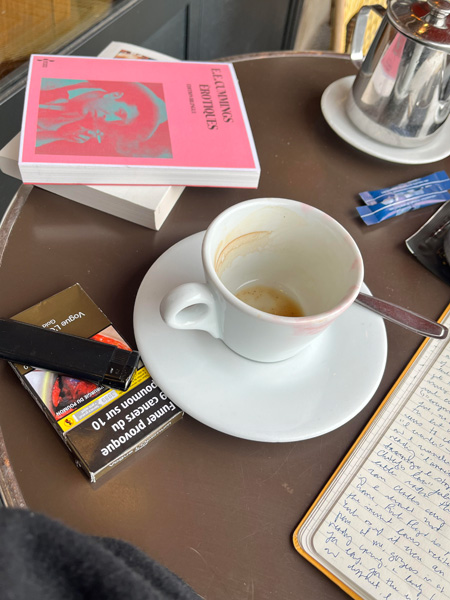 Image courtesy of Fiona McMurrey
Image courtesy of Fiona McMurrey
On a gray Paris morning, the zinc countertop of a corner café gleams under the neon light. A man in a wool coat orders un petit noir, slides a euro across the bar, and drinks it standing up one quick sip before heading back into the drizzle. Outside, the terrace is half-empty. The wicker chairs, once crowded with Parisians and tourists alike, sit waiting for conversations that never start.
France’s café, that quintessential symbol of daily life, democracy, and daydreaming, is quietly disappearing.
A Nation Built Around a Cup
For centuries, the café has been France’s living room. It’s where revolutions were plotted, novels written, and arguments over politics, football, and philosophy have unfolded daily. Balzac, Sartre, and Simone de Beauvoir all wrote at café tables. Even today, the image of a Parisian with a cigarette in one hand and a tiny espresso in the other endures like a national emblem.
But beneath that romantic veneer, the numbers tell a sobering story. In the 1960s, France had nearly 200,000 cafés. Today, fewer than 35,000 remain and the number continues to dwindle each year.
The reasons are as layered as the foam on a café crème: economics, urban change, shifting habits, and an evolving sense of what community means.
The Price of Progress
Running a café in France has never been easy, but today it borders on impossible. Rent in city centers has soared, labor laws are complex, and competition from chains and takeaway coffee shops is fierce.
The rise of remote work has also eroded the daily rhythm that sustained the café — the ritual of stopping in before or after work, reading the newspaper, chatting with the bartender. The café was once a social necessity; now, it’s an option.
Changing Habits, Changing Streets
Recognizing the café’s cultural importance, the French government has begun to act. Local initiatives like the 1,000 Cafés program aim to revive cafés in rural areas by offering subsidies, training, and community partnerships. Some towns have turned their cafés into multi-purpose spaces: half-bar, half-post office, sometimes even a grocery.
And while traditional cafés decline, a new wave of hybrid spaces is emerging. In Lyon and Nantes, cafés double as bookshops or artist studios; in Bordeaux, a cooperative café is run by its customers. The old rituals may be fading, but the instinct to gather, to talk, to belong endures.
The Soul of France, Still Brewing
Perhaps café culture isn’t dying so much as transforming. Its essence, conversation, community, pause is migrating into new forms. A small espresso sipped at the counter still means something sacred in France: a few minutes stolen from time.
Even in Paris, where rents and real estate squeeze tradition from every corner, certain cafés remain eternal. The clink of cups at Le Procope, the chatter at Café de Flore, the quiet melancholy of a tabac at dusk. These are not just relics, but reminders.
Because in the end, the café is not about coffee. It’s about connection, fleeting, imperfect, human.
And as long as there are people who need to watch the world go by, France’s café spirit that stubborn, smoky, beautiful rhythm of life will never quite disappear.